Key takeaways:
- Reparations are seen as essential for healing historical injustices beyond just financial compensation, emphasizing the importance of acknowledging shared histories.
- Social media serves as a critical platform for amplifying marginalized voices and facilitating urgent discussions about reparations, fostering community and activism.
- Effective communication in reparations dialogue necessitates active listening, clarity, and engagement to create a supportive and empathetic environment.
- Personal experiences shared through social media enhance the reparations conversation, illustrating the transformative power of storytelling in advocating for change.
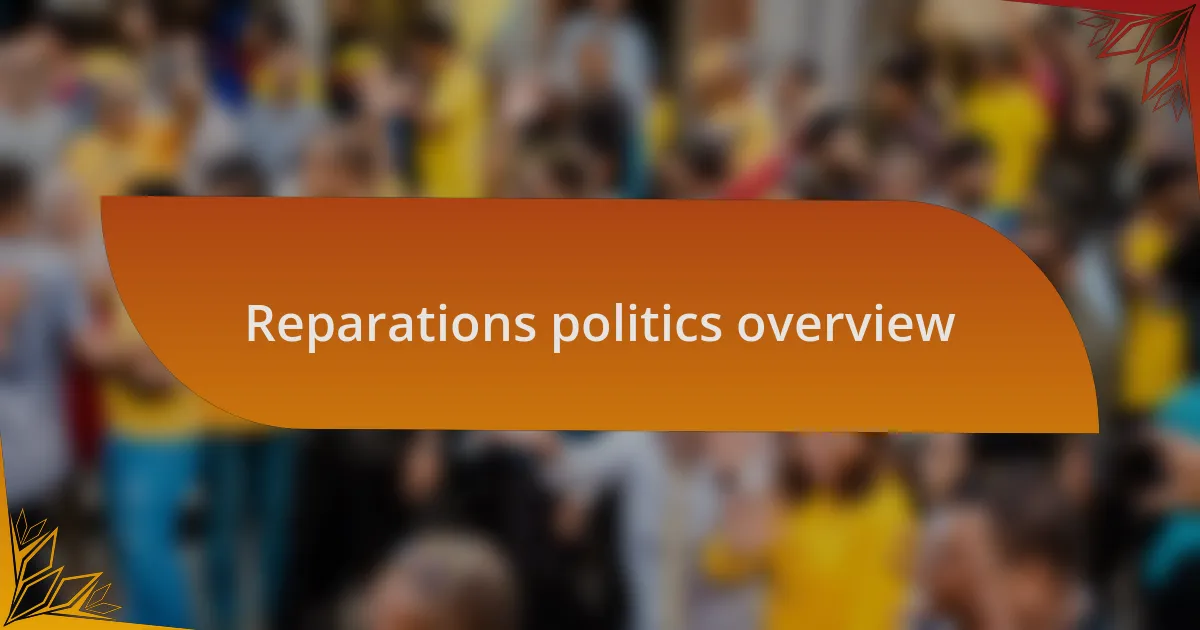
Reparations politics overview
Reparations politics is a multifaceted discussion that pivots around acknowledging historical injustices and addressing their lingering impacts today. As I’ve engaged with this topic, I often find myself reflecting on the emotional weight carried by those from marginalized communities. This leads me to wonder, how can we truly make amends for generations of disenfranchisement?
In many circles, reparations are seen not just as financial compensation but as a vital step towards healing and reconciliation. I remember a powerful dialogue I had during a community forum, where individuals shared their stories of hardship related to systemic racism. It struck me that these narratives underscore the urgency of reparations — they’re not merely a policy change, but a necessary acknowledgment of shared histories and experiences.
Yet, navigating the politics of reparations can feel overwhelming. Questions arise: What forms should reparations take? Cash payments? Educational opportunities? In my conversations, I’ve come to appreciate that these discussions are crucial; they not only shape policies but also pave the way for a more just society. Ultimately, reparations politics invites us to confront uncomfortable truths and aim for a more equitable future.
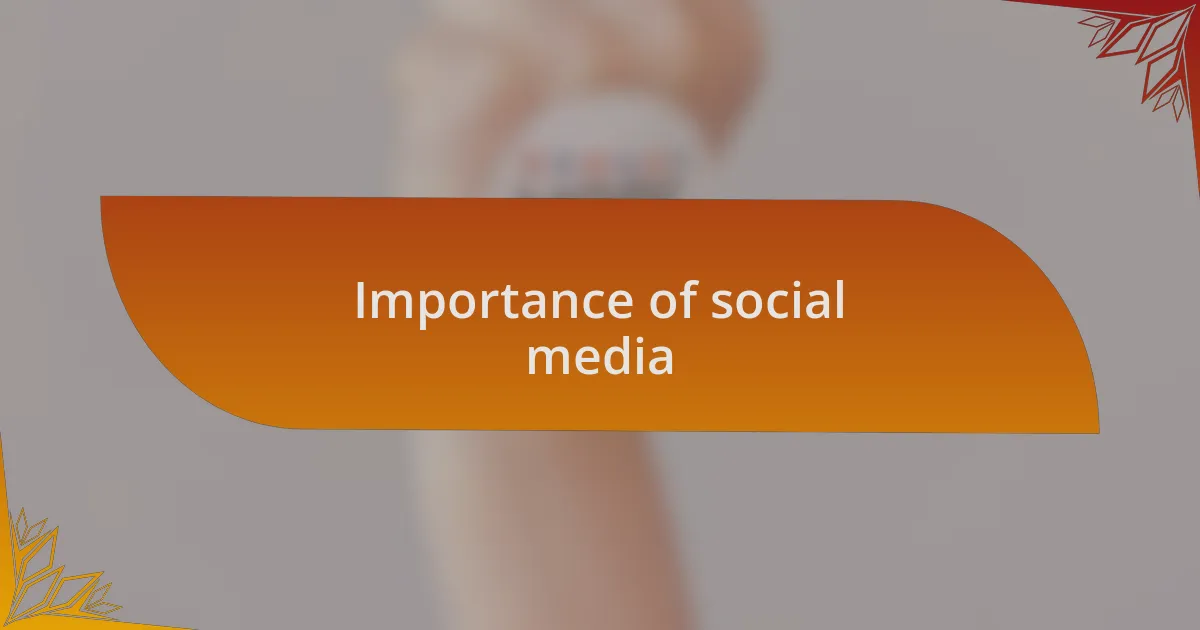
Importance of social media
Social media plays a pivotal role in the reparations dialogue, acting as a platform for marginalized voices that often go unheard. I remember scrolling through Twitter during a heated discussion about reparations, where individuals shared personal experiences and systemic injustices. This exchange not only educated me but also created a sense of community and urgency around the topic. It made me realize how crucial these platforms are for amplifying diverse perspectives.
Through social media, we can facilitate conversations that might not happen in traditional spaces. I recall a powerful Instagram Live session that I participated in, where advocates discussed reparations with passion and clarity. Here, discussions weren’t just theoretical; they were deeply personal and resonated with many viewers, driving engagement and awareness. Isn’t it fascinating how a simple post can ignite a movement or inspire someone to take action?
Moreover, social media allows for the rapid dissemination of information, helping to inform and mobilize communities towards collective action. I often think about how a single viral tweet can impact public opinion and spark grassroots campaigns. It’s incredible to see how these digital dialogues can translate into real-world advocacy, reinforcing the importance of social media as a tool for social change.
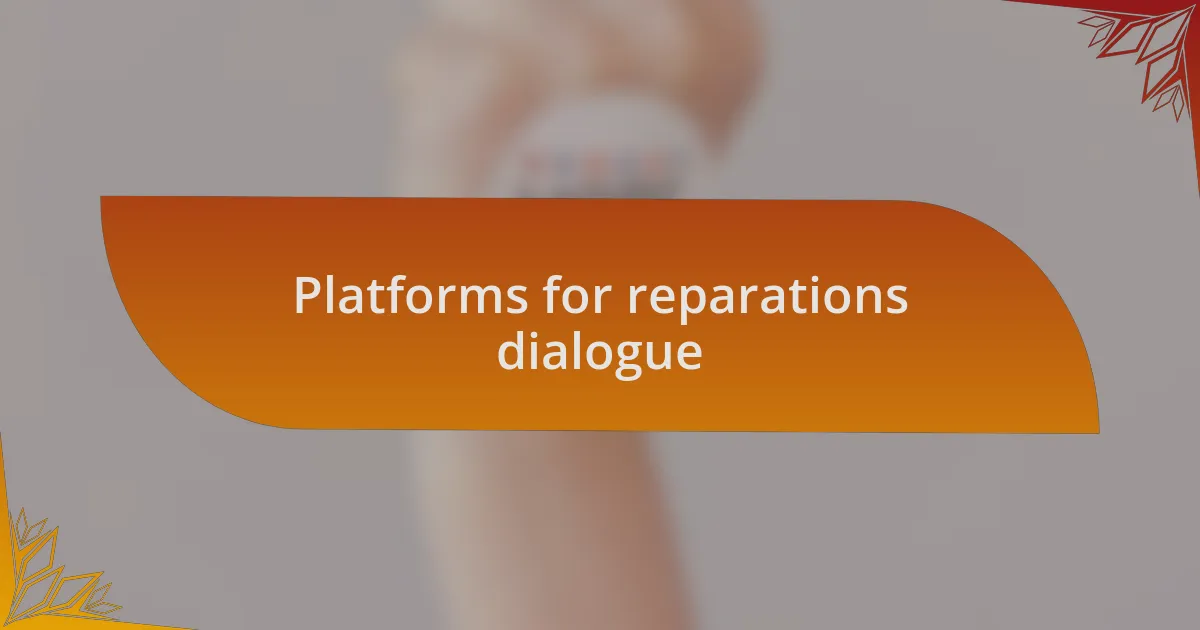
Platforms for reparations dialogue
Platforms like Twitter and Instagram are my go-to spaces for engaging in reparations dialogue. A few months back, I jumped into a Twitter Spaces discussion that was buzzing with voices from all over the country. Listening to the heartfelt stories shared by others not only opened my eyes to different experiences but also made me feel connected to a larger movement. It’s remarkable how a digital platform can foster such intimate connections.
I find Facebook groups particularly powerful for community-building around reparations discussions. In a local group I’m part of, I was amazed to see how people shared resources, articles, and their own familial histories related to reparations. It feels supportive to join conversations where everyone is invested in understanding our past and advocating for a future that acknowledges these injustices. Have you ever experienced a moment that made you feel like you were part of something bigger?
Another valuable platform is TikTok, where creators use engaging videos to tackle complex themes surrounding reparations. I once stumbled across a quick, yet impactful video explaining the historical context of reparations, which not only educated me but also prompted me to reflect on how we can push forward. Isn’t it incredible how a short clip can leave such a lasting impression? The creative freedom these platforms provide encourages fresh perspectives that have the potential to reach a wider audience.
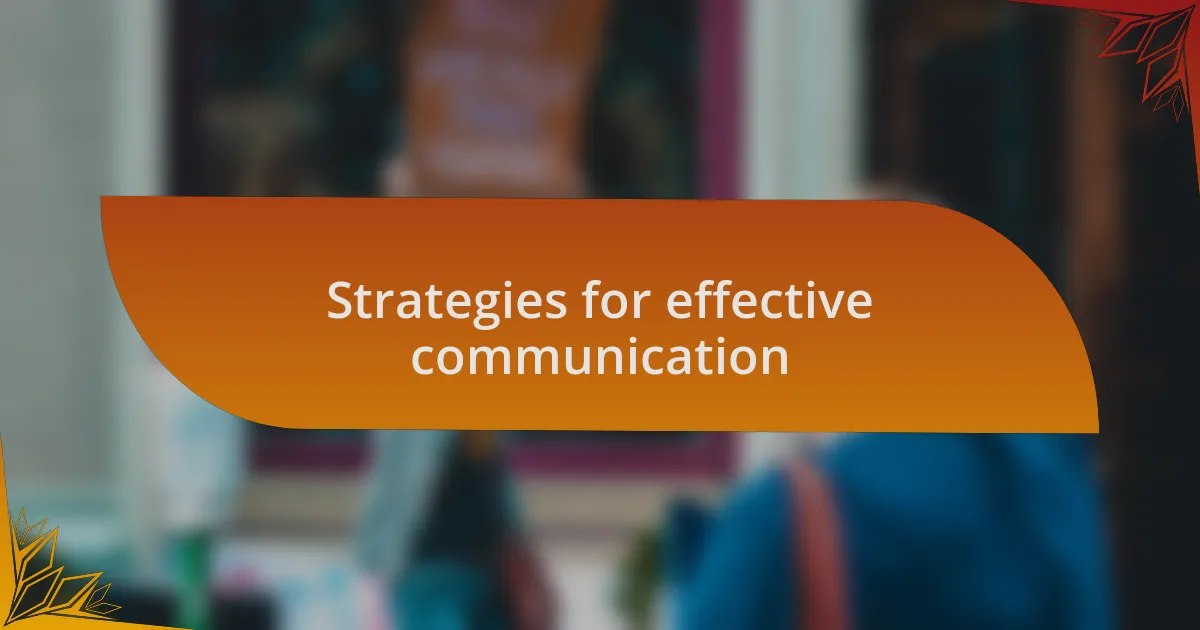
Strategies for effective communication
Effective communication is essential in reparations dialogue, particularly when navigating diverse perspectives. I often prioritize active listening, allowing others to share their stories without interruption. Once, during a heartfelt Instagram Live session, I realized that creating a space where others felt heard transformed the conversation into a collective healing experience. Have you ever noticed how a simple, attentive nod can encourage someone to share more deeply?
I also believe in the power of clarity in my messaging. Utilizing straightforward language allows me to reach a broader audience, ensuring that complex topics aren’t alienating. For instance, when I shared a post breaking down reparations into digestible pieces, the engagement skyrocketed. It became evident that relatable words and analogies could spark curiosity and invite questions—how often do we avoid conversations simply because the terminology feels too heavy?
Engagement doesn’t stop at what we say; it’s also about how we respond. I often include follow-up questions to encourage further dialogue. After posting a thought-provoking quote related to reparations, I asked my followers how they connected with it personally. The responses flooded in, creating an enriching exchange of ideas. Shouldn’t we make it a priority to not just speak but also to invite others to join the conversation?
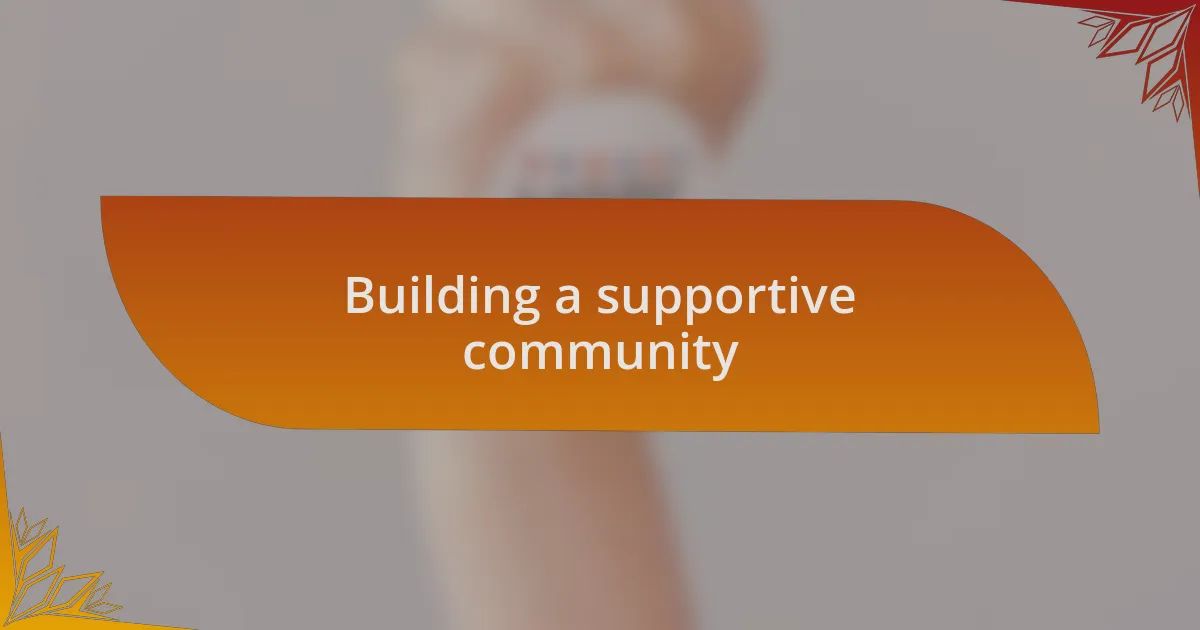
Building a supportive community
Building a supportive community around reparations dialogue is about cultivating trust and empathy among participants. I remember a particular Facebook group I joined, where members shared their vulnerabilities and experiences with racial injustices. The honesty in those stories created a bond that transcended the digital space, making each of us feel like we were part of something much larger than ourselves. How powerful can a shared experience be in forging connections?
Creating spaces for interaction is vital in fostering a sense of community. On Twitter, I’ve organized virtual discussions where participants can express their thoughts and concerns openly. One memorable session was when we brainstormed ways to address representation in media narratives. The diverse viewpoints not only enriched our understanding but also led to actionable goals, making me wonder—how often do we miss out on collaborative insights by not encouraging open dialogue?
Support also comes from acknowledging the emotional weight of the reparations conversation. I often remind my community that it’s okay to feel overwhelmed; these topics can be heavy. During one discussion, a member expressed frustration over the slow progress of reparations, and by validating her feelings, I saw the entire group rally to provide comfort and solidarity. Isn’t it incredible how a simple act of recognition can uplift those in distress?
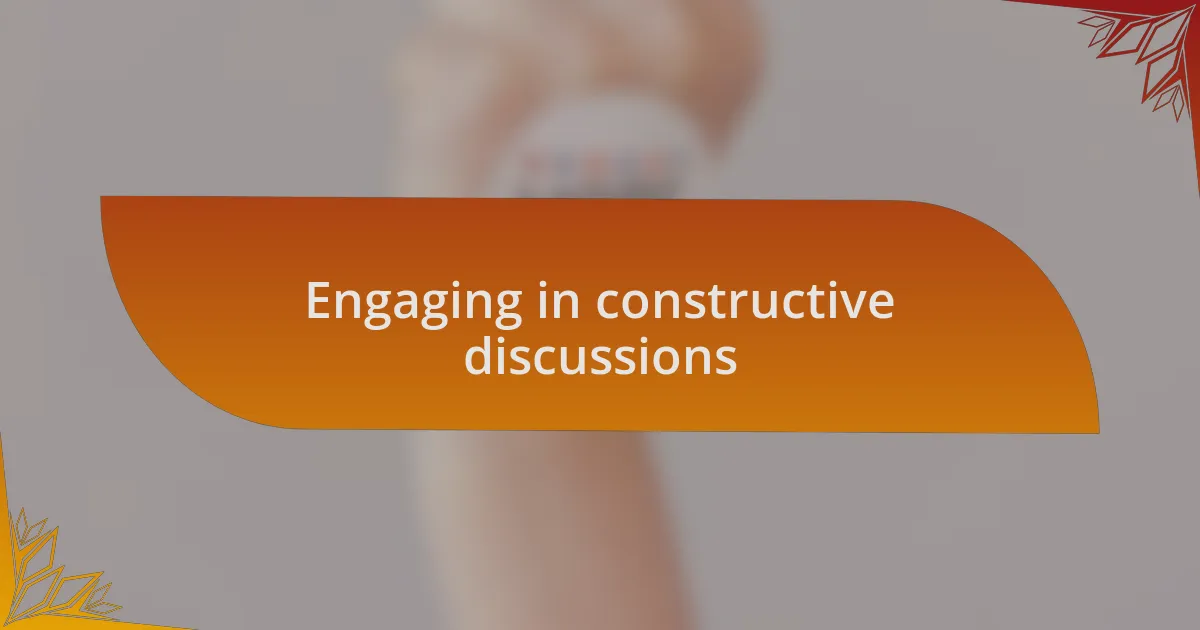
Engaging in constructive discussions
Engaging in constructive discussions requires a focus on listening just as much as sharing. I’ve found that during my weekly Twitter chats, setting ground rules about respectful dialogue encourages participants to open up. One time, after someone shared a particularly poignant story about their family’s history, I noticed the entire vibe shifted. Everyone seemed more attuned to their words, creating an atmosphere where empathy could flourish. Isn’t it fascinating how intentionally creating space for listening can transform our conversations?
Moreover, I often strive to address misconceptions head-on, simply because knowledge is power in these discussions. There was this enlightening moment when a participant voiced a common misunderstanding about the reparations debate. Instead of dismissing them, I took the time to explain the historical context surrounding that misunderstanding. They responded positively, and it sparked a thoughtful exchange that deepened our collective knowledge. Have you ever considered how enlightening it can be to transform a disagreement into a learning opportunity?
Additionally, I believe humor can serve as an unexpected but effective tool in easing the tension around serious topics. During one of my online forums, someone made a light-hearted comment about the complexities of navigating reparations rhetoric. We all chuckled, and it lifted the heaviness of the discussion, allowing us to re-engage with a fresh perspective. How often do we let humor pave the way for deeper understanding in challenging conversations?
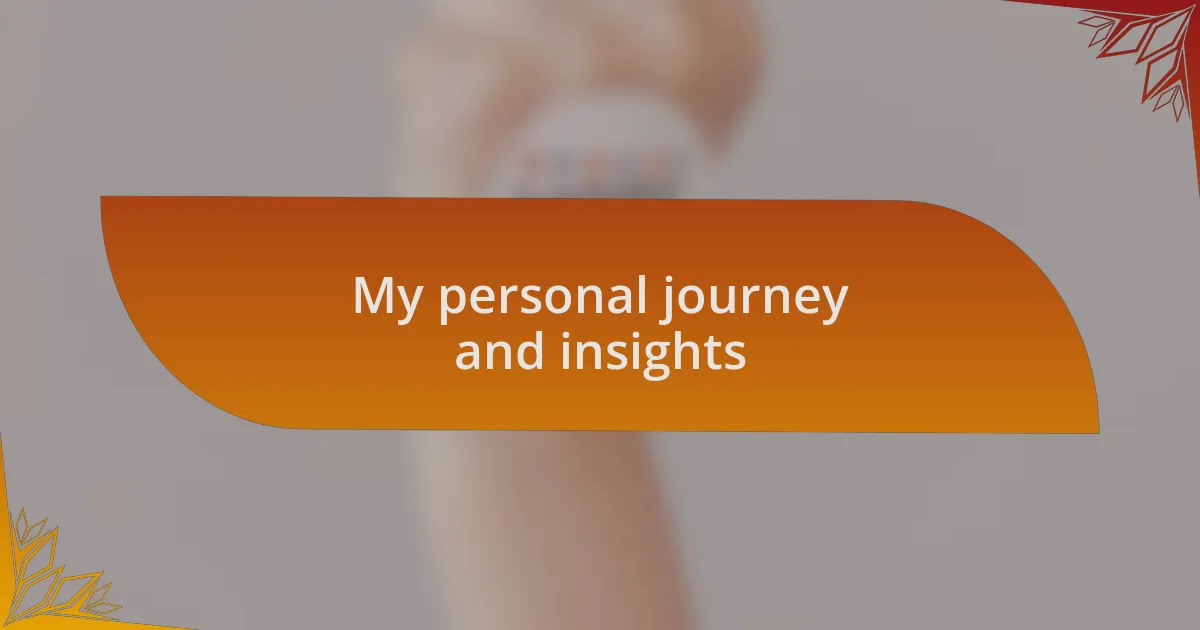
My personal journey and insights
My journey with social media in reparations dialogue has been deeply transformative. I remember the first time I shared my thoughts on Instagram about reparations; I felt a mix of excitement and apprehension. I wondered if anyone would resonate with my perspective. To my surprise, the responses were overwhelmingly positive, which taught me the power of vulnerability in sparking meaningful conversations.
I’ve also encountered my fair share of pushback. Once, I posted about the economic implications of reparations, and some critics labeled my view as naive. Instead of retreating, I reached out to them directly. This led to a back-and-forth exchange that clarified my viewpoint and, surprisingly, opened them up to new ideas. Hasn’t it been said that the richest dialogues often emerge from conflict? It’s a reminder that discomfort can lead to growth and understanding.
Reflecting on my experiences, I’ve realized that social media adds layers to this dialogue. I cherish the stories shared with me through private messages, like the time a follower opened up about their family’s ties to systemic injustices. Their courage has inspired me to advocate more passionately. Each of these interactions reinforces my belief that sharing personal experiences enriches our collective narrative in ways statistics simply cannot. How can we deny the power of personal stories in catalyzing change?